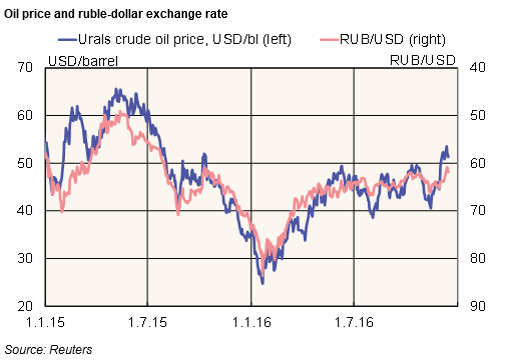BOFIT Weekly Review 50/2016
Russia and OPEC agree to reduce oil output
The Organization of Petroleum Exporting Countries, OPEC, announced on November 30 that it had reached agreement with its member countries on reducing crude oil production by 1.2 million barrels a day, effective January 2017. The agreement to cut oil output is conditional on non-OPEC countries' participation. On the same day, Russia's energy minister Alexander Novak said his country would gradually reduce crude oil production by 0.3 million barrels a day during the first half of 2017 as long as OPEC members hold to the agreement. On December 10, Russia and ten other non-OPEC countries announced that collectively they would reduce production by 0.5 million barrels a day. Russia reaffirmed that its contribution to the cuts would be 0.3 million barrels a day.
Crude oil prices rose on world markets after the OPEC announcement. The price of Urals-grade crude was up about 16 % in dollar terms to around $52 a barrel. Higher oil prices have lifted the ruble's exchange rate about 6 % against the dollar and the euro. The exchange rate now stands at about 61 rubles to the dollar and 65 rubles to the euro.
Many observers do not expect the agreed production cuts to hold, as OPEC members have not stuck to earlier agreements after oil prices have increased after cuts announced. The production cuts also come at a time when oil production is hitting historical highs. In November, Russian output was 11.2 million barrels a day, a post-Soviet record. A deal among OPEC members, Russia and other non-OPEC members is exceptional to the extent that it holds.
